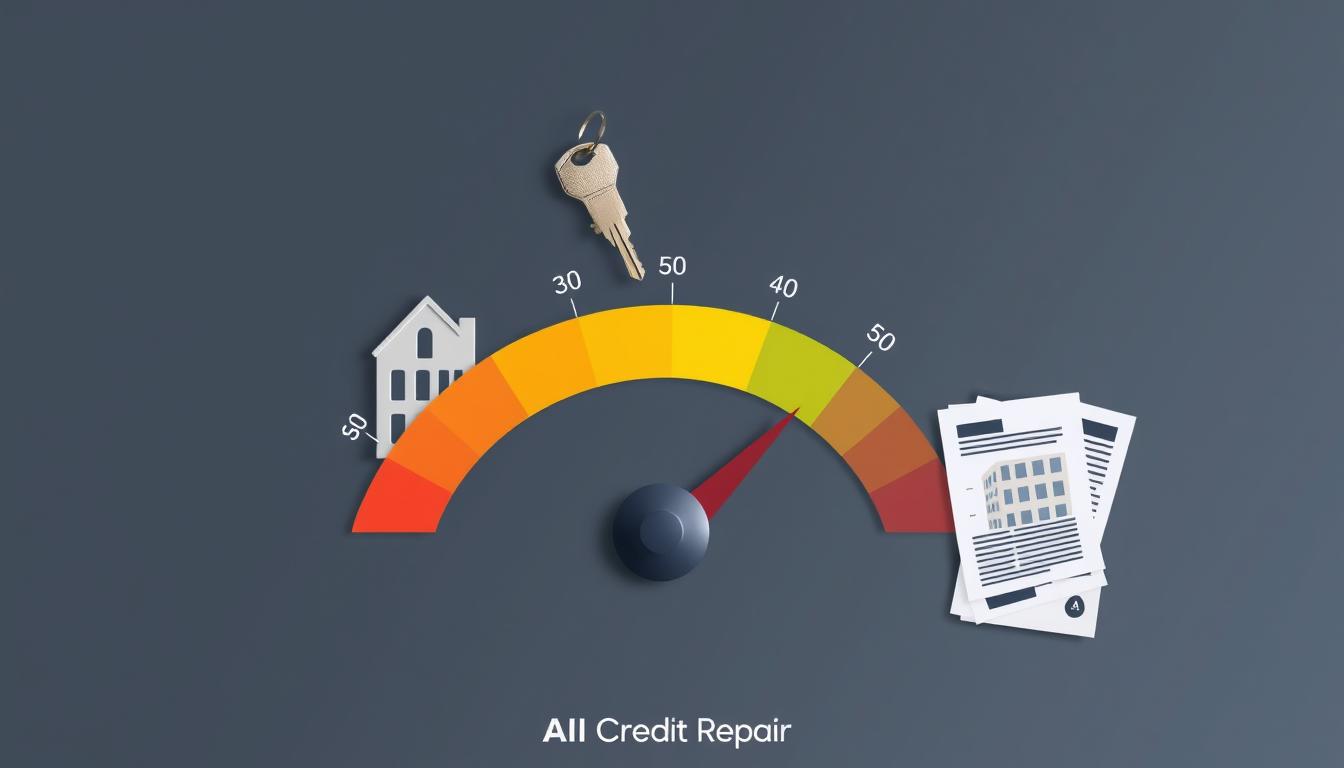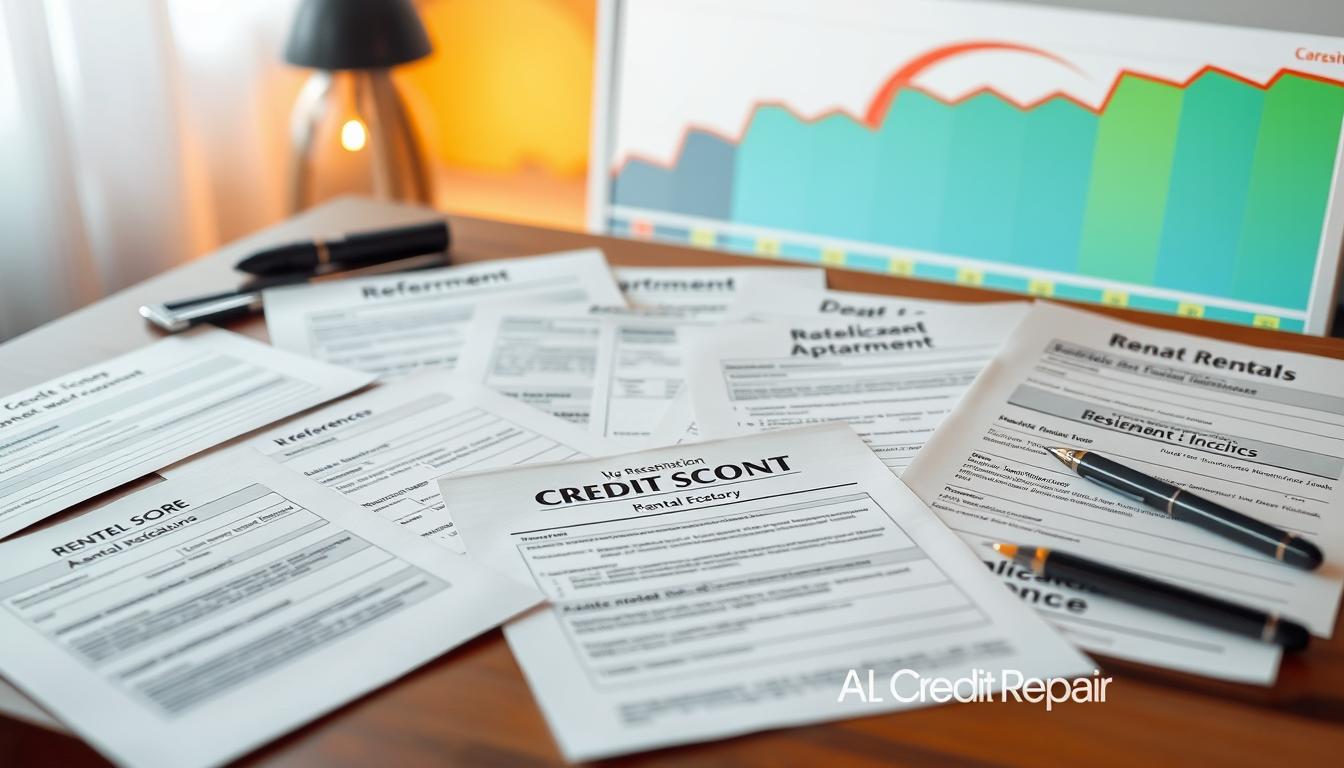Renting an apartment can be thrilling and challenging. Understanding credit score requirements is key for prospective tenants. This guide will help you navigate the rental application process confidently.
We’ll explore minimum credit scores for apartments and other factors landlords consider. You’ll gain valuable insights to improve your chances of securing your desired rental property.
Key Takeaways
- Landlords typically look for a minimum credit score of 620 to 700 for apartment rentals.
- Different credit scoring models, such as FICO and VantageScore, can impact the credit requirements.
- Beyond credit scores, landlords also consider factors like income, employment history, and previous rental records.
- Strategies like improving your credit score, offering additional security deposits, or using a co-signer can help overcome a low credit score.
- Staying informed about the rental application process and required documentation is crucial for a successful application.
Understanding Credit Scores for Rental Applications
Your credit score is vital when renting an apartment. Landlords use it to judge your ability to pay rent. Knowing about credit scores helps you prepare for rental applications.
The Importance of Credit Scores in Renting
Credit scores show landlords how financially responsible you are. A high score means you pay bills on time. A low score might worry landlords about your ability to pay rent.
Landlords use credit scores to make smart choices. They want to avoid tenants who might not pay or need eviction.
Different Credit Scoring Models and Their Implications
FICO and VantageScore are the main credit scoring models for rentals. Each model has unique criteria and ranges. These differences can affect your chances of getting a rental property.
- FICO Scores: FICO scores range from 300 to 850. Higher scores mean lower credit risk. Many landlords prefer applicants with FICO scores of 620 or higher.
- VantageScore: VantageScore also ranges from 300 to 850. Its criteria differ from FICO, possibly leading to different scores for the same person.
Knowing these models helps you prepare for rental applications. You can take steps to improve your credit if needed.

Typical Minimum Credit Score Requirements
Landlords often set specific credit score requirements for potential tenants. The minimum credit score for renting an apartment can vary based on several factors. These include the landlord’s preferences, property location, and market conditions.
A credit score of 620 or higher is usually the average credit score to rent an apartment. This range is often the minimum threshold for most landlords. Scores below this may make securing an apartment more difficult.
Lower scores can make landlords view applicants as higher risk. However, individual landlords may have their own specific requirements. Other factors like income and rental history also play a role.
| Credit Score Range | Rental Approval Likelihood |
|---|---|
| 720 and above | Excellent, highly likely to be approved |
| 680 to 719 | Good, likely to be approved |
| 620 to 679 | Average, may be approved with additional scrutiny |
| 580 to 619 | Below average, approval may be difficult |
| 500 to 579 | Poor, approval is unlikely without additional steps |
“Landlords typically want to see a credit score of 620 or higher to approve a rental application, as this indicates a level of financial responsibility.”

Factors Landlords Consider Beyond Credit Scores
Credit scores are important in rental applications, but landlords look at other factors too. They check income, employment history, and previous rental experiences. These help predict if a tenant will pay rent on time.
Income and Employment History
Landlords want tenants with stable income who can pay rent regularly. They ask for pay stubs, tax returns, or employment letters as proof. They may also look at job type, position, and how long you’ve worked there.
Previous Rental History
Past rental experiences show how you might act as a tenant. Landlords often ask for references from previous landlords or property managers. They check if you paid rent on time and kept the property in good condition.
| Factors Landlords Consider | Importance |
|---|---|
| Credit Score | High |
| Income and Employment History | High |
| Previous Rental History | High |
Looking at these factors gives landlords a better picture of potential tenants. It helps them understand your financial stability and rental behavior. This approach aims to create a good experience for both landlords and tenants.

What Credit Score to Rent an Apartment
Your credit score is vital when renting an apartment. It determines if you’ll be approved. The minimum score needed varies by landlord or property management company.
Most landlords prefer a credit score of 600 to 620. This fair range shows you pay on time and manage debt well. Some may accept lower scores, while others require 650 or 700.
A higher credit score can boost your rental application. Landlords favor applicants with scores of 700 or above. These good or excellent scores indicate lower-risk tenants.
A credit score below 600 may cause rental challenges. Landlords might see you as high-risk. They may require a larger deposit or a co-signer.
The credit score needed to rent an apartment varies. Aim for 600 or above to improve approval chances. With a lower score, consider improving it or offering alternatives.
Dealing with a Low Credit Score
Don’t lose hope if you have a low credit score. You can improve it and boost your chances of renting an apartment. Take proactive steps to address issues and show landlords your creditworthiness.
Strategies for Improving Your Credit Score
Boosting your credit score requires time and effort. The rewards can be significant when renting an apartment. Here are some effective strategies to try:
- Review your credit report and dispute any errors or inaccuracies you find.
- Make payments on time, even if it’s just the minimum. Payment history is a crucial factor in your credit score.
- Reduce your credit card balances and keep your utilization rate low, ideally below 30%.
- Become an authorized user on someone else’s credit card with a long, positive history.
- Consider getting a secured credit card and make on-time payments to build your credit.
Offering Additional Security Deposits or Co-Signers
If your credit score remains a concern, consider offering an extra security deposit. You could also find a co-signer to boost your chances of rental approval.
These methods show your commitment to the landlord. They can offset the risk linked to your low credit score for apartment rental.
An additional security deposit shows you’re willing to invest more upfront. This can make up for a low credit score for renting. A co-signer with better credit can give landlords the assurance they need.
Improving your credit score for renting opens doors to better rental options. Exploring security deposits and co-signers can help you find your ideal home, despite credit challenges.

Tips for Improving Your Chances of Rental Approval
Renting an apartment can be competitive, especially with less-than-perfect credit. But don’t worry! There are ways to boost your chances of approval. You can impress potential landlords by showcasing your qualifications.
A key tip is to prepare a strong rental application. Gather all necessary documents like proof of income and references. Present them neatly to show your reliability and attention to detail.
- Communicate openly and honestly with the landlord. Explain any credit issues upfront and offer solutions like a larger security deposit. Landlords often appreciate transparency and willingness to work with them.
- Highlight your positive rental history, if you have one. Show evidence of timely rent payments and good relationships with previous landlords.
- Consider offering to pay rent in advance or increase the security deposit. This can ease landlords’ concerns about your ability to make on-time payments.
These tips to get approved for apartment rental can improve your odds. Even with a lower credit score, you can increase your chances of increasing your chances of renting an apartment.
“The key to getting approved for an apartment rental is to present yourself as a reliable and responsible tenant, even if your credit score isn’t perfect.”
The Application Process and What to Expect
Applying for an apartment rental is a key step in finding your new home. Being prepared can boost your chances of success. Let’s explore the process and required documents.
Required Documentation and Information
Landlords need specific documents to assess potential tenants. This helps them make informed decisions about renting out their property.
The typical apartment rental application process includes several items. Here’s what you might need to provide:
- Completed rental application form
- Proof of income, such as pay stubs, tax returns, or employment verification
- Identification documents, like a driver’s license or passport
- Contact information for previous landlords or personal references
- Authorization for a credit and background check
- Security deposit, typically equal to one month’s rent
Gathering these documents early can speed up your application. It also shows landlords that you’re serious and well-prepared.
| Required Document | Purpose |
|---|---|
| Completed Rental Application | Provides detailed information about your background, employment, and rental history |
| Proof of Income | Assures the landlord of your ability to pay rent consistently |
| Identification Documents | Verifies your identity and legal right to reside in the property |
| Previous Landlord References | Demonstrates your track record as a reliable and responsible tenant |
| Credit and Background Check Authorization | Allows the landlord to assess your creditworthiness and any potential risks |
| Security Deposit | Serves as a financial guarantee against potential damages or unpaid rent |
Being ready with these documents can make your rental journey smoother. It shows landlords you’re a responsible tenant.
Understanding the process and preparing well increases your chances of success. You’ll be better equipped to handle the application smoothly.
Renting with No Credit History
Renting an apartment without credit history can be challenging. But don’t worry! There are ways to overcome this obstacle. Let’s explore some effective strategies for securing your desired rental.
Demonstrate Financial Responsibility
Show your financial stability even without a credit score. Gather pay stubs, bank statements, and income proof. These documents can prove your ability to pay rent on time.
Provide Additional Assurances
Offer a larger security deposit to increase your chances of approval. Find a reliable co-signer with good credit history. They can vouch for your financial responsibility and serve as a backup.
Highlight Rental History
Emphasize your track record of on-time payments if you have previous rental experience. This shows landlords that you’re a responsible tenant, even without an established credit score.
These strategies can help you overcome renting challenges without credit history. Stay persistent and proactive in your approach. With effort, you’ll find the perfect rental that meets your needs.
Conclusion
This article explored credit score requirements for renting apartments. Landlords consider various factors besides credit scores. A good credit score helps, but strategies exist for those with lower scores.
Understanding the rental process can boost your confidence. Improving your credit score, offering extra deposits, or finding a co-signer can help overcome obstacles.
Stay informed and proactive to enhance your rental application. Use available resources to increase your chances of success. This approach can help you find the perfect home within your budget.

